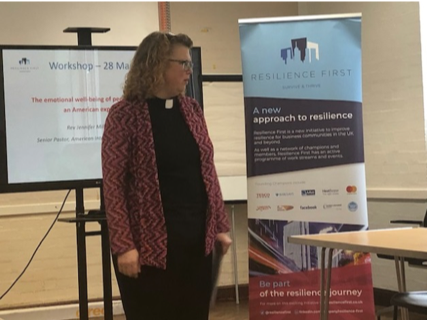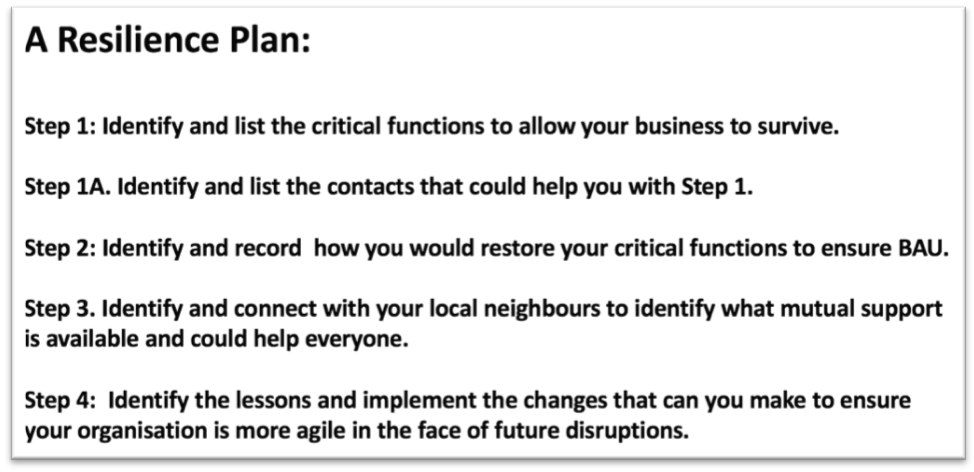Enhancing resilience in Fitzrovia through local plans: briefing and exercise
March 28 2019
This briefing and exercise, kindly hosted by the American International Church, was designed to help attendees think about their own resilience as part of the local area, and what support their own organisation might need or could be able to give. Around 25 people attended.
Discussion
Barclays branch manager Andrew Green, who chairs the Fitzrovia resilience group for Resilience First, introduced the event and the first speaker was the Rev Jennifer Mills-Knutsen, Senior Pastor, American International Church.
The emotional wellbeing of people in a crisis
Jennifer recounted her personal experience of supporting a community following a deadly tornado in Kentucky in 2012.
In total, 11 people died, 400 people lost their homes and school collapsed.
Children were missing for hours and people watched their homes being destroyed in front of them.
Jennifer spoke about how the basics such as food, water and shelter were provided, and the recovery also focused on rebuilding homes and facilities and improving the community’s preparedness for future events.
But her personal experience was that unless people’s emotional needs were also attended to, they couldn’t move on. People were too traumatised to move back into houses, or too scared to go back to work.
She explained how people search for meaning when life-changing events happen: a common question is “why me and not them?”.
Communities can suffer real losses: if people no longer for safe, for example, or if they have to move away and then don’t return.
Emotional recovery is both immediate and long term, and if unaddressed can lead to conditions such as anxiety, irritability, exhaustion and even post-traumatic stress disorder (PTSD).
Mental health first aid training was highly recommended.
Jennifer recalled how the community recovered. Immediate support was given through chaplains, home visits and commemorative events.
A non-profit was established to help rebuild homes. And people’s need to tell stories and talk about what happened was supported through a videographer, also providing a means of ensuring the community would not forget.
She also observed that a traumatic event doesn’t have to be a tornado: she recently supported manager who sought advice on how to help his staff after one of their colleagues took his own life.
Lessons in resilience from a major retailer
The second speaker was Marcus Dennison, head of resilience for Tesco, who outlined the retailer’s approach to resilience.
Tesco takes resilience seriously as it thinks it helps the company to provide a better service to its customers. He also outlined the dependencies on it, which also make resilience critical:
- 80m shopping trips a week
- 440,000 staff
- A huge supply chain
- The businesses and people that also support that supply chain
Tesco asks six questions to help improve its resilience:
- What are the things that could harm me/us?
- How would they harm me/us?
- How can I stop them harming me/us?
- If they did happen, what must I/we have?
- What is the best way to act if it happens?
- What am/are I/we going to recover, rebuilding, restore, rebound or regenerate to?
Marcus outlined steps Tesco has taken to help its staff and customers in the event of a terrorist incident in store, ensuring staff are aware of latest ‘run, hide, tell’ guidance, information on what to do with unattended items, and implementing a security crisis management guide.
Each store also has a phone that has the CitizenAid app on, which also includes guidance on first aid.
He also spoke about Tesco’s response to the Grenfell Tower fire: as a retailer, it determined it was in a position to provide water to people on the ground, as well as food, cloths and phones, and to use its charity partnerships to provide aid and support.
The lessons were significant for Tesco. It transpired the water wasn’t needed, and the unco-ordinated response meant items like clothing, food and phones didn’t reach the right people. 
It also discovered that it was well set up for charity partnerships abroad but less so in the UK.
The observation was that the size of the company meant it proved difficult to get the Tesco ‘machine’ moving.
It has now overhauled its response plan, improving its relationships with local authorities where it trades, putting centralised co-ordination in place, and creating links with the Red Cross in the UK.
Another example was provided of how it responded after severe flooding in Carlisle in 2015.
It built, stocked and opened a temporary store in five days, helping local people to access the supplies they needed to continue with both their recovery effort and their daily lives.
Watch a video of this here.
Exercise
Robert Hall of Resilience First conducted an exercise with the attendees to help them think about the key steps that need to be taken in these areas if a major incident affected their organisation, directly or indirectly:


Attendees were asked to put themselves into the shoes of a manager of a large retailer affected by a major incident in which a member of staff was killed and power, water, transport and other critical needs were affected.
The discussion considered:
- Access to information: who holds it, how is it shared?
- Sharing of resources
- Widening existing communication groups, in particular to help smaller businesses
- Identifying key staff
- Understanding the supply chain the implications on this
- How are the public feeling and what are they doing or needing
- Moral considerations – just because you can open, doesn’t mean you should
- What can you learn from borough resilience officers / emergency planning officers
- The long-term community consideration and knowledge of what exists now that people can make use of or know more about
This Resilience Framework was distributed to help support thinking and planning for local resilience.
For further reading, please visit our Knowledge Hub.
